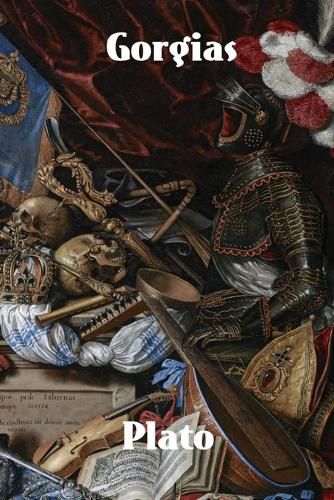Readings Newsletter
Become a Readings Member to make your shopping experience even easier.
Sign in or sign up for free!
You’re not far away from qualifying for FREE standard shipping within Australia
You’ve qualified for FREE standard shipping within Australia
The cart is loading…






This title is printed to order. This book may have been self-published. If so, we cannot guarantee the quality of the content. In the main most books will have gone through the editing process however some may not. We therefore suggest that you be aware of this before ordering this book. If in doubt check either the author or publisher’s details as we are unable to accept any returns unless they are faulty. Please contact us if you have any questions.
Gorgias is a Socratic dialogue written by Plato around 380 BC. The dialogue depicts a conversation between Socrates and a small group of sophists (and other guests) at a dinner gathering. Socrates debates with the sophist seeking the true definition of rhetoric, attempting to pinpoint the essence of rhetoric and unveil the flaws of the sophistic oratory popular in Athens at the time. The art of persuasion was widely considered necessary for political and legal advantage in classical Athens, and rhetoricians promoted themselves as teachers of this fundamental skill. Some, like Gorgias, were foreigners attracted to Athens because of its reputation for intellectual and cultural sophistication. Socrates suggests that he is one of the few Athenians to practice true politics.
???Socrates interrogates Gorgias to determine the true definition of rhetoric, framing his argument in the question format, "What is X?" (2).[3] He asks, "... why don't you tell us yourself what the craft you're an expert in is, and hence what we're supposed to call you?" (449e).
Throughout the remainder of the dialogue, Socrates debates about the nature of rhetoric. Although rhetoric has the potential to be used justly, Socrates believes that in practice, rhetoric is flattery; the rhetorician makes the audience feel worthy because they can identify with the rhetorician's argument.
$9.00 standard shipping within Australia
FREE standard shipping within Australia for orders over $100.00
Express & International shipping calculated at checkout
This title is printed to order. This book may have been self-published. If so, we cannot guarantee the quality of the content. In the main most books will have gone through the editing process however some may not. We therefore suggest that you be aware of this before ordering this book. If in doubt check either the author or publisher’s details as we are unable to accept any returns unless they are faulty. Please contact us if you have any questions.
Gorgias is a Socratic dialogue written by Plato around 380 BC. The dialogue depicts a conversation between Socrates and a small group of sophists (and other guests) at a dinner gathering. Socrates debates with the sophist seeking the true definition of rhetoric, attempting to pinpoint the essence of rhetoric and unveil the flaws of the sophistic oratory popular in Athens at the time. The art of persuasion was widely considered necessary for political and legal advantage in classical Athens, and rhetoricians promoted themselves as teachers of this fundamental skill. Some, like Gorgias, were foreigners attracted to Athens because of its reputation for intellectual and cultural sophistication. Socrates suggests that he is one of the few Athenians to practice true politics.
???Socrates interrogates Gorgias to determine the true definition of rhetoric, framing his argument in the question format, "What is X?" (2).[3] He asks, "... why don't you tell us yourself what the craft you're an expert in is, and hence what we're supposed to call you?" (449e).
Throughout the remainder of the dialogue, Socrates debates about the nature of rhetoric. Although rhetoric has the potential to be used justly, Socrates believes that in practice, rhetoric is flattery; the rhetorician makes the audience feel worthy because they can identify with the rhetorician's argument.